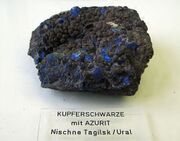Difference between revisions of "Tenorite"
Jump to navigation
Jump to search


(username removed) |
|||
| (5 intermediate revisions by 2 users not shown) | |||
| Line 1: | Line 1: | ||
| + | [[File:1024px-Kupferschwärze (Tenorit) mit Azurit - Nischne Tagilsk, Ural.jpg|thumb|Tenorite on azurite; Image credit: Ra'ike [https://en.wikipedia.org/wiki/Tenorite Wikipedia]]] | ||
== Description == | == Description == | ||
| − | + | [[File:Tenorite Raman RRUFF R120076.png|thumb|Raman spectrum of synthetic tenorite; Credit [https://rruff.info/tenorite/display=default/R120076 RRUFF]]] | |
| − | A dark gray copper oxide mineral with a metallic luster. Tenorite was named for G. Tenor, in Naples about 1860. While it can occur as an ore, tenorite has also been found as an alteration product of cuprite forming a thin dark layer over the red. The presence of tenorite as a patina may indicate the object was heated before or during burial (Scott 1997). In a basic environment of a burial site, tenorite has also been found as an alteration product of azurite (Gutscher et al 1989). | + | A dark gray to black copper oxide mineral with a metallic luster. Tenorite was named for G. Tenor, in Naples about 1860. While it can occur as an ore, tenorite has also been found as an alteration product of [[cuprite]] forming a thin dark layer over the red. The presence of tenorite as a patina may indicate the object was heated before or during burial (Scott 1997). In a basic environment of a burial site, tenorite has also been found as an alteration product of [[azurite]] (Gutscher et al 1989). |
== Synonyms and Related Terms == | == Synonyms and Related Terms == | ||
| Line 7: | Line 8: | ||
copper (II) oxide; cupric oxide; melaconite; tenorita (Esp.); Tenorit (Deut.); tenoriet (Ned.) | copper (II) oxide; cupric oxide; melaconite; tenorita (Esp.); Tenorit (Deut.); tenoriet (Ned.) | ||
| − | == | + | == Physical and Chemical Properties == |
| − | Monoclinic crystal system | + | * Monoclinic crystal system naturally forming large masses |
| + | * Luster is metallic. | ||
| + | * Fracture = conchoidal | ||
| + | * Insoluble in water | ||
{| class="wikitable" | {| class="wikitable" | ||
| Line 20: | Line 24: | ||
|- | |- | ||
! scope="row"| Melting Point | ! scope="row"| Melting Point | ||
| − | | 1065 | + | | 1065 C |
|- | |- | ||
! scope="row"| Density | ! scope="row"| Density | ||
| − | | 5.8-6.4 | + | | 5.8-6.4 g/ml |
|} | |} | ||
| − | == | + | ==Resources and Citations== |
| + | |||
| + | * D.Scott, "Copper Compounds in Metals and Colorants: Oxides and Hydroxides" ''Studies in Conservation'', 42:93-100, 1997. | ||
| + | |||
| + | * D.Gutscher, B.Muhlethaler, A.Portmann, A.Reller, "Conversion of Azurite into Tenorite" ''Studies in Conservation'', 34:117-122, 1989. | ||
| + | |||
| + | * D.A.Scott, ''Copper and Bronze in Art: Corrosion, Colorants and Conservation'', Getty Publications, Los Angeles, 2002. | ||
| + | |||
| + | * Wikipedia: [https://en.wikipedia.org/wiki/Tenorite Tenorite] Accessed Dec 2022 | ||
| − | + | * Webmineral: [https://www.webmineral.com/data/Tenorite.shtml Tenorite] Accessed Dec 2022 | |
[[Category:Materials database]] | [[Category:Materials database]] | ||
Latest revision as of 10:35, 8 December 2022

Tenorite on azurite; Image credit: Ra'ike Wikipedia
Description

Raman spectrum of synthetic tenorite; Credit RRUFF
A dark gray to black copper oxide mineral with a metallic luster. Tenorite was named for G. Tenor, in Naples about 1860. While it can occur as an ore, tenorite has also been found as an alteration product of Cuprite forming a thin dark layer over the red. The presence of tenorite as a patina may indicate the object was heated before or during burial (Scott 1997). In a basic environment of a burial site, tenorite has also been found as an alteration product of Azurite (Gutscher et al 1989).
Synonyms and Related Terms
copper (II) oxide; cupric oxide; melaconite; tenorita (Esp.); Tenorit (Deut.); tenoriet (Ned.)
Physical and Chemical Properties
- Monoclinic crystal system naturally forming large masses
- Luster is metallic.
- Fracture = conchoidal
- Insoluble in water
| Composition | CuO |
|---|---|
| Mohs Hardness | 3.5 |
| Melting Point | 1065 C |
| Density | 5.8-6.4 g/ml |
Resources and Citations
- D.Scott, "Copper Compounds in Metals and Colorants: Oxides and Hydroxides" Studies in Conservation, 42:93-100, 1997.
- D.Gutscher, B.Muhlethaler, A.Portmann, A.Reller, "Conversion of Azurite into Tenorite" Studies in Conservation, 34:117-122, 1989.
- D.A.Scott, Copper and Bronze in Art: Corrosion, Colorants and Conservation, Getty Publications, Los Angeles, 2002.
- Wikipedia: Tenorite Accessed Dec 2022
- Webmineral: Tenorite Accessed Dec 2022